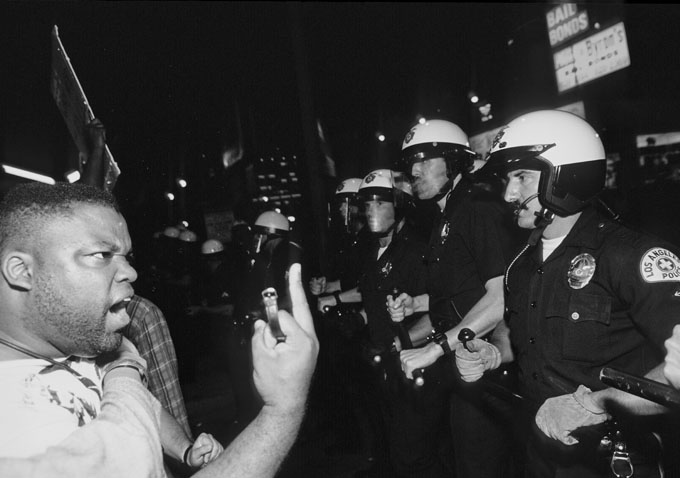 "Uprising: Hip Hop & the LA Riots" gets right to the point, starting off with a bang, or perhaps a police baton to the face, as Rodney King walks down the stretch of highway where his notorious beating took place, reenacting that fateful night. The film, produced by VH1 Rock Docs and directed by Mark Ford, tells the story of the 1992 LA riots, using stunning archival footage and interviews with people who were there, while also drawing the connection between the riots and the gangsta rap of the time, featuring N.W.A., Ice Cube and Ice T as both the poets and prophets of this outburst of rage and destruction. Fittingly, it's narrated by Snoop Dogg, who found his success in the wake of the riots. The film is an explosive, blistering analysis of this historic event in American history, viewed through the lens of hindsight 20 years later.
"Uprising: Hip Hop & the LA Riots" gets right to the point, starting off with a bang, or perhaps a police baton to the face, as Rodney King walks down the stretch of highway where his notorious beating took place, reenacting that fateful night. The film, produced by VH1 Rock Docs and directed by Mark Ford, tells the story of the 1992 LA riots, using stunning archival footage and interviews with people who were there, while also drawing the connection between the riots and the gangsta rap of the time, featuring N.W.A., Ice Cube and Ice T as both the poets and prophets of this outburst of rage and destruction. Fittingly, it's narrated by Snoop Dogg, who found his success in the wake of the riots. The film is an explosive, blistering analysis of this historic event in American history, viewed through the lens of hindsight 20 years later.
'Uprising' lays out the blueprint of the atmosphere in Los Angeles at this time, illustrating how police chief Darryl Gates recruited white Southern military men for his force, which, combined with Ronald Reagan's no tolerance drug policy created an environment of stunning police brutality and racial profiling in the ghettos of L.A. The violence and persecution at the hands of the police force this community was subject to (tanks with battering rams were knocking down houses and thousands of people were being arrested every week) was articulated with precise anger and threats and prophecies of vengeance by the rappers of this time, most notably in N.W.A.'s "Fuck Tha Police," which became the theme song of the riots.
Upon the news of the not-guilty verdict in the trial of the LAPD officers who beat King, the simmering anger and rage erupted on the streets of L.A., creating a scene of total violence and anarchy that raged for three days. The film recreates this detonation via home video, helicopter news camera footage, and the photographs of Bart Bartholomew, a photographer who was essentially the first victim of the angry mob that turned on him after police fled the scene, escaping in his car as the windows shattered around him. At the corner of Florence and Normandie, drivers were pulled from their vehicles and beaten to near death. One of the "L.A. Four," who beat truck driver Reginald Denny in the street, Henry Watson is one of the most compelling figures in the film. He feels little remorse for the incident, and who can blame him? This outburst of violence came after 400 years of the white man's oppression, and the riots served as a primal scream, a demand for respect and understanding.
The archival footage used in 'Uprising' is absolutely stunning. Filmmaker Matthew McDaniel captured a street level view of the madness and anarchy on his Magnavox video camera, and his interviews with rioters were sampled by Dr. Dre on his seminal album The Chronic. The film also illustrates the violence that occurred between the Korean and black populations, as tensions had been running high since a Korean shop owner was let off with probation after shooting and killing a young black girl during an altercation at her store. Footage of Korean shop owners defending their turf by firing handguns at random in the streets is chilling. And yet, as described by interviews throughout the film, much of the anarchy and looting served to unify the groups such as blacks and latinos, Crips and Bloods.
Even though 53 people were killed during the riots, many injured, and property destroyed and looted, the film takes the stance that this event was the necessary steam vent on the boiling pot that had been simmering since at least the Watts riots in 1965. Henry Watson's lack of remorse for the event illustrates that perfectly. Watson doesn't feel guilty for the emotional cry that these riots were — a reaction to the problems of a broken and corrupt system, the demand for respect by the black man. 'Uprising' is an absolutely necessary documentation of this event, especially in a post-Occupy world, as OWS seemed to be a similar emotional movement demanding a change to the ideology and infrastructure that oppresses so many. As the bass to "Fuck Tha Police" and Sublime's "April 29th, 1992" reverberates through your chest, you just may be inspired to hurl a trash can through a plate glass window yourself. [A-]

